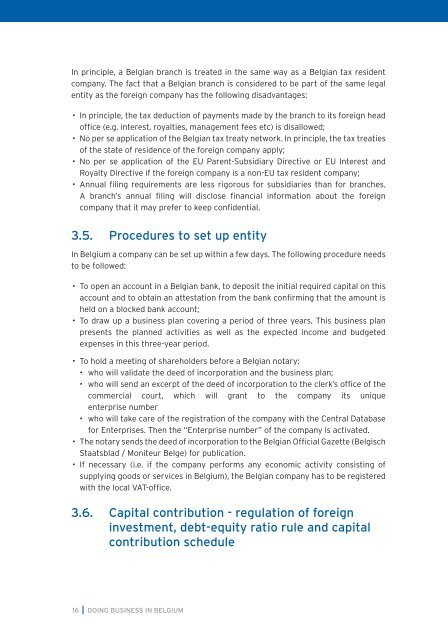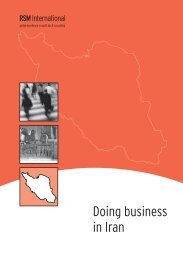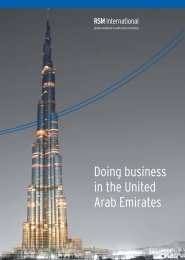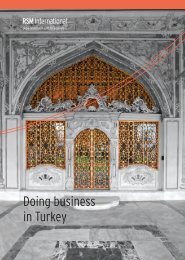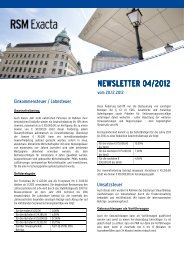Doing Business in Belgium - RSM International
Doing Business in Belgium - RSM International
Doing Business in Belgium - RSM International
You also want an ePaper? Increase the reach of your titles
YUMPU automatically turns print PDFs into web optimized ePapers that Google loves.
In pr<strong>in</strong>ciple, a Belgian branch is treated <strong>in</strong> the same way as a Belgian tax resident<br />
company. The fact that a Belgian branch is considered to be part of the same legal<br />
entity as the foreign company has the follow<strong>in</strong>g disadvantages:<br />
• In pr<strong>in</strong>ciple, the tax deduction of payments made by the branch to its foreign head<br />
office (e.g. <strong>in</strong>terest, royalties, management fees etc) is disallowed;<br />
• No per se application of the Belgian tax treaty network. In pr<strong>in</strong>ciple, the tax treaties<br />
of the state of residence of the foreign company apply;<br />
• No per se application of the EU Parent-Subsidiary Directive or EU Interest and<br />
Royalty Directive if the foreign company is a non-EU tax resident company;<br />
• Annual fil<strong>in</strong>g requirements are less rigorous for subsidiaries than for branches.<br />
A branch’s annual fil<strong>in</strong>g will disclose f<strong>in</strong>ancial <strong>in</strong>formation about the foreign<br />
company that it may prefer to keep confidential.<br />
3.5. Procedures to set up entity<br />
In <strong>Belgium</strong> a company can be set up with<strong>in</strong> a few days. The follow<strong>in</strong>g procedure needs<br />
to be followed:<br />
• To open an account <strong>in</strong> a Belgian bank, to deposit the <strong>in</strong>itial required capital on this<br />
account and to obta<strong>in</strong> an attestation from the bank confirm<strong>in</strong>g that the amount is<br />
held on a blocked bank account;<br />
• To draw up a bus<strong>in</strong>ess plan cover<strong>in</strong>g a period of three years. This bus<strong>in</strong>ess plan<br />
presents the planned activities as well as the expected <strong>in</strong>come and budgeted<br />
expenses <strong>in</strong> this three-year period.<br />
• To hold a meet<strong>in</strong>g of shareholders before a Belgian notary:<br />
• who will validate the deed of <strong>in</strong>corporation and the bus<strong>in</strong>ess plan;<br />
• who will send an excerpt of the deed of <strong>in</strong>corporation to the clerk’s office of the<br />
commercial court, which will grant to the company its unique<br />
enterprise number<br />
• who will take care of the registration of the company with the Central Database<br />
for Enterprises. Then the “Enterprise number” of the company is activated.<br />
• The notary sends the deed of <strong>in</strong>corporation to the Belgian Official Gazette (Belgisch<br />
Staatsblad / Moniteur Belge) for publication.<br />
• If necessary (i.e. if the company performs any economic activity consist<strong>in</strong>g of<br />
supply<strong>in</strong>g goods or services <strong>in</strong> <strong>Belgium</strong>), the Belgian company has to be registered<br />
with the local VAT-office.<br />
3.6. Capital contribution - regulation of foreign<br />
<strong>in</strong>vestment, debt-equity ratio rule and capital<br />
contribution schedule<br />
3.6.1. Capital contribution<br />
Capital contribution to a company can be made <strong>in</strong> cash or <strong>in</strong> k<strong>in</strong>d.<br />
In case where a capital contribution is made <strong>in</strong> cash, the shareholders must deposit<br />
the amount on a blocked account prior to the execution of the deed of <strong>in</strong>corporation.<br />
Such capital contribution needs to be certified by a notary public.<br />
As from the 1st of January 2006, the registration duty due on capital contribution<br />
has been abolished (except <strong>in</strong> certa<strong>in</strong> cases – see below).<br />
In case where a capital contribution is made <strong>in</strong> assets (other than cash), a report<br />
must be drawn up by an auditor. In addition, the board of directors must establish a<br />
report stat<strong>in</strong>g the reasons of the asset contribution (the <strong>in</strong>terest of the company).<br />
Both reports must be delivered to the notary on the date of execution of the deed of<br />
<strong>in</strong>corporation (or the capital <strong>in</strong>crease). In pr<strong>in</strong>ciple, there is no registration duty on<br />
such contribution.<br />
However, if a physical person contributes a real estate (located <strong>in</strong> <strong>Belgium</strong> that is<br />
totally or partially used as a dwell<strong>in</strong>g house) to a Belgian company, this contribution<br />
is subject to a registration duty of 12.5% (<strong>in</strong> Wallonia and <strong>in</strong> Brussels-Capital) or<br />
10% (<strong>in</strong> Flanders).<br />
A contribution of real estate whereby the company takes up part of a contributor’s<br />
debt is called a mixed contribution. This type of contribution is partially subject to<br />
registration duty of 12.5%.<br />
The mixed contribution rule does not apply <strong>in</strong> case of contributions of a branch of<br />
activity or of a universality of goods. In these cases, the contribution is fully exempt<br />
from registration duty.<br />
3.6.2. Regulation of foreign <strong>in</strong>vestment<br />
No restriction specifically applies to foreign <strong>in</strong>vestors.<br />
Foreign <strong>in</strong>vestment <strong>in</strong> <strong>Belgium</strong> generally takes the form of establish<strong>in</strong>g subsidiaries<br />
or establish<strong>in</strong>g a branch. The Belgian governmental authorities actively promote<br />
foreign <strong>in</strong>vestment (<strong>in</strong> particular, with new tax regulations such as the notional<br />
<strong>in</strong>terest deduction, the deduction for patents, etc).<br />
3.6.3. Debt-equity ratio rules<br />
No general th<strong>in</strong> capitalization rules exist <strong>in</strong> <strong>Belgium</strong>. Only <strong>in</strong> very specific circumstances<br />
the Belgian tax authorities can apply the so-called “7-to-1” or the “1-to-1” rule.<br />
16<br />
DOING BUSINESS IN BELGIUM<br />
DOING BUSINESS IN BELGIUM<br />
17


